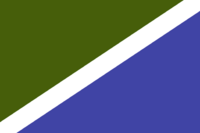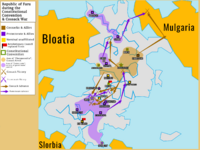Revolutionary Faru: Difference between revisions
(Created page with "Revolutionary Faru, also known as Preconstitutional Faru or the Protectorate Era, was a brief period of time during 1919 (April 2024) before the establishment Republic of Faru where several strongmen, alongside the constitutional convention ruled Faru. file:convention.svg|300px|right|thumb|The Convention right before the constitution was passed<br>{{color box|#E06666|border=darkgrey|Socialists: 5 delegates}} {{color box|#FFD966|border=darkgrey|Liberals: 5 del...") |
No edit summary |
||
| (11 intermediate revisions by 2 users not shown) | |||
| Line 1: | Line 1: | ||
Revolutionary Faru, also known as Preconstitutional Faru or the Protectorate Era, was a brief period of time during 1919 (April 2024) before the establishment [[Republic of Faru]] where several strongmen, alongside the [[constitutional convention]] ruled Faru. | {{Infobox Polity | ||
|colorcode=#A020F0 | |||
|name=Republic of Faru | |||
|logo=[[File:FARflag.png|200px]] | |||
|caption=Flag of Faru | |||
|capital= {{ublist |''De Jure'' Kroletfaru |''De Facto''[[Urbis City]] }} | |||
|commonlanguages=English | |||
|government=Fragemented unitary provisional republic under a military dictatorship | |||
|headofstate=Protector of the Republic [[Chaton Loupius]] | |||
|legislature=[[Faruan Constitutional Convention|Constitutional Convention]] | |||
|map=[[File:FARRevMap.png|200px]] | |||
|map_size=25 | |||
|precededby= {{ublist |[[Bloatia]] |[[Slorbo-Glormorian Empire|Slorbo-Glormoria]] }} | |||
|succeededby= [[Faru]] | |||
}} | |||
'''Revolutionary Faru''', also known as '''Preconstitutional Faru''' or the '''Protectorate Era''', was a brief period of time during 1919 (April 2024) before the establishment [[Republic of Faru]] where several strongmen, alongside the [[Faruan Constitutional Convention|constitutional convention]] ruled Faru following the <nowiki>[[Nationalist Revolution]]</nowiki>. | |||
[[file:convention.svg|300px|right|thumb|The Convention right before the constitution was passed<br>{{color box|#E06666|border=darkgrey|Socialists: 5 delegates}} {{color box|#FFD966|border=darkgrey|Liberals: 5 delegates}} {{color box|#DCDCDC|border=darkgrey|Independents: 3 delegates}} {{color box|#C3B18E|border=darkgrey|Cossacks: 1 delegate}} {{color box|#D5A6BD|border=darkgrey|Monarchists: 1 delegate}}]] | [[file:convention.svg|300px|right|thumb|The Convention right before the constitution was passed<br>{{color box|#E06666|border=darkgrey|Socialists: 5 delegates}} {{color box|#FFD966|border=darkgrey|Liberals: 5 delegates}} {{color box|#DCDCDC|border=darkgrey|Independents: 3 delegates}} {{color box|#C3B18E|border=darkgrey|Cossacks: 1 delegate}} {{color box|#D5A6BD|border=darkgrey|Monarchists: 1 delegate}}]] | ||
Faru gained it's independence from [[Bloatia]] and [[Slorbo-Glormorian Empire|Slorbo-Glormoria]] in 1919 following the efforts of [[Kenneth Infaru]] and the | Faru gained it's independence from [[Bloatia]] and [[Slorbo-Glormorian Empire|Slorbo-Glormoria]] in 1919 following the efforts of [[Kenneth Infaru]] and the Faruan Liberation Army. Kenneth Infaru however never lived to see the results of an independent Faru, as he was assassinated by an anti-Faruan radical soon after he and his forces kicked Bloatian forces out of the country. | ||
The following months were defined by strife, despotism and [[Cossack War|nomadic banditry]], as the citizens of the newly independent Faru organized a constitutional convention, and successors to the Farun Liberation Army, such as the [[Farun Army]] and later the [[Farun Model Army]], vied for power, while semi-nomadic [[Cossacks]] raided and looted the northern regions of the nation. | The following months were defined by strife, despotism and [[Cossack War|nomadic banditry]], as the citizens of the newly independent Faru organized a constitutional convention, and successors to the Farun Liberation Army, such as the [[Farun Army]] and later the [[Farun Model Army]], vied for power, while semi-nomadic [[Cossacks]] raided and looted the northern regions of the nation. With settlements new radical actions appeared with [[Divesk Revolution|revolutionaries]] obtaining [[Pen Island|two]] [[Miners' and Soldiers' Council of Divesk|settlements]]. | ||
== History == | == History == | ||
| Line 13: | Line 29: | ||
== Prominent Figures == | == Prominent Figures == | ||
Revolutionary Faru was a very disorganized polity, barely functioning as a state, and as such had no official leader or organs of power beyond the Constitutional Convention, however there were many people who could claim to have some control over the polity during that period. | Revolutionary Faru was a very disorganized polity, barely functioning as a state, and as such had no official leader or organs of power beyond the [[Faruan Constitutional Convention|Constitutional Convention]], however there were many people who could claim to have some control over the polity during that period. | ||
* [[ | * [[Chaton Loupius]], self proclaimed [[Protector of the Republic]], leader of the [[Farun Model Army]] and founder of the [[Liberal Caucus]] as well as mayor of [[Urbis City]]. | ||
* [[Ashton von Luttwitz]], second Protector of the Republic, leader of the Farun Model Army. | * [[Ashton von Luttwitz]], second Protector of the Republic, leader of the Farun Model Army. | ||
* [[Loga Pincoya]], leader of the short lived [[Farun Army]] and speaker of the Convention | * [[Loga Pincoya]], leader of the short lived [[Farun Army]] and speaker of the Convention | ||
* [[Sergei Dunayevskiy]], Leader of the independent faction. | * [[Sergei Dunayevskiy]], Leader of the independent faction. | ||
* [[De Remuva (Season 4)|Remo Remgélique Rémy Roberto de Remuva]], member of the Industrialist faction, leader of the [[Faruan Defense Force]], founder of the [[Institutional Mining Company|Mineral Mining Company]] (and [[Mineral Mining Company Town|Town]]) and head of [[Miners' and Soldiers' Council of Divesk|Divesk]]. | |||
[[Category:Season 4]] | |||
[[Category:Political]] | |||
[[Category:History]] | |||
[[Category:Lore]] | |||
{{Navbox Revolutionary Faru}} | |||
Latest revision as of 15:01, 2 October 2024
Republic of Faru | |
|---|---|
 Flag of Faru | |
| Name | Republic of Faru |
| Capital |
|
| Common languages | English |
| Government | Fragemented unitary provisional republic under a military dictatorship |
| Head of State | Protector of the Republic Chaton Loupius |
| Legislature | Constitutional Convention |
| Map of Republic of Faru | |
 | |
| Preceded by | |
| Succeeded by | Faru |
Revolutionary Faru, also known as Preconstitutional Faru or the Protectorate Era, was a brief period of time during 1919 (April 2024) before the establishment Republic of Faru where several strongmen, alongside the constitutional convention ruled Faru following the [[Nationalist Revolution]].
Faru gained it's independence from Bloatia and Slorbo-Glormoria in 1919 following the efforts of Kenneth Infaru and the Faruan Liberation Army. Kenneth Infaru however never lived to see the results of an independent Faru, as he was assassinated by an anti-Faruan radical soon after he and his forces kicked Bloatian forces out of the country.
The following months were defined by strife, despotism and nomadic banditry, as the citizens of the newly independent Faru organized a constitutional convention, and successors to the Farun Liberation Army, such as the Farun Army and later the Farun Model Army, vied for power, while semi-nomadic Cossacks raided and looted the northern regions of the nation. With settlements new radical actions appeared with revolutionaries obtaining two settlements.
History
tbd, see talk page for more.
Prominent Figures
Revolutionary Faru was a very disorganized polity, barely functioning as a state, and as such had no official leader or organs of power beyond the Constitutional Convention, however there were many people who could claim to have some control over the polity during that period.
- Chaton Loupius, self proclaimed Protector of the Republic, leader of the Farun Model Army and founder of the Liberal Caucus as well as mayor of Urbis City.
- Ashton von Luttwitz, second Protector of the Republic, leader of the Farun Model Army.
- Loga Pincoya, leader of the short lived Farun Army and speaker of the Convention
- Sergei Dunayevskiy, Leader of the independent faction.
- Remo Remgélique Rémy Roberto de Remuva, member of the Industrialist faction, leader of the Faruan Defense Force, founder of the Mineral Mining Company (and Town) and head of Divesk.


